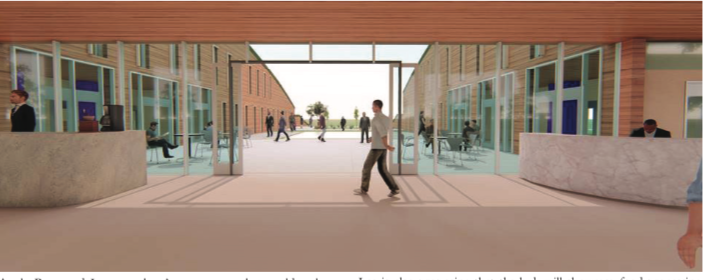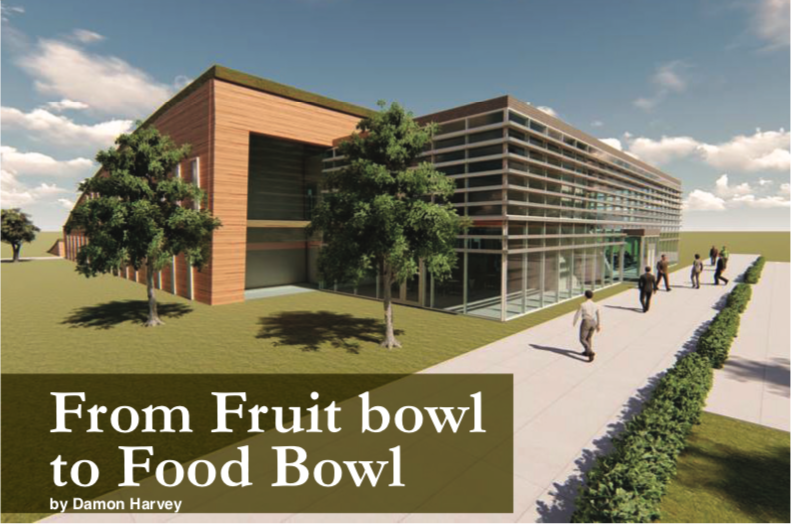Hastings was once branded as the Fruitbowl of New Zealand but a proposed $18 million Food Innovation Hub is set to position Hastings and Hawke’s Bay as the nation’s food capital.
Hastings District Council has been the champion of an idea first put forward by local businessman Trevor Taylor in 2013 to develop a one-stop shop that will be used by food and beverage start-ups to create new products; an education facility to upskill people for roles within the food processing sector as well as be the home for government support services to the food industry and a hub for associated support businesses.
Lee Neville, the chair of the Hawke’s Bay Innovation Hub Governance Group and economic development lead at Hastings District Council says the hub will be a “think tank” to share ideas, create new and exciting food products as well as developing and show casing innovative food processing equipment.
The Government’s Provincial Growth Fund invested $200,000 to develop a business case which was followed up in September with an investment announcement of $12 million.
Lee and project support Tony Gray are now busy filling the $6 million shortfall from private food related businesses as well as preparing funding requests to the region’s five councils as part of the 2020 Annual Plans.
When Trevor Taylor first put forward the idea, the proposed home was on land his business interests owned in the Tomoana area but the net is being cast a little wider but Tomoana and Whakatu still remain the preferred base, as part of the HDC Eastside Plan that is focussed on creating a new commercial/industrial zone.
The preferred site size is 2 hectares, of which 1.3ha would be developed in Stage 1 with the remainder developed as new tenants sign up. Lee is in discussions with two businesses that are interested to move their marketing teams away from the factory operation to the hub.
“Some of the advantages that they see is that when they are bringing international clients here to look they can take them to their production facility as well as visit the centre of excellence and innovation which in turn gives the client greater confidence of their capacity and capability as a successful food processer,” he says.
Lee says the hub will unlock Hawke’s Bay’s potential in the food, beverage and agri-tech sectors as well as industry training and development.
The business case undertaken by Sapere identified that the hub has the potential to create 500 new jobs in the region and boost the Gross Domestic Product value by $100m.
Hastings is already the home of well- established food processing businesses such as Heinz and newcomers like the Apple Press and Lee says there’s many more that could scale up quicker via an innovation hub.
As part of designing a sustainable food innovation hub that doesn’t rely on funding top ups from central or local government, Lee and Tony are looking to mimic the success of the Waikato Innovation Park, which has returned a profit.
“As part of the PGF process they helped us identify a multi-national in Hawke’s Bay that wants to upskill not only their workforce but those that work in food processing in the region.”
The business is now working with the PGF, EIT Hawke’s Bay and Hastings District Council to put together a feasibility study to offer courses and train people in food processing.
“It not just about the business that wants to establish the training but it will be offered to all food processing businesses in the sector. Labour is a major issue and they all require staff with food related and processing skills.
“For example if you trained as an engineer, you can take a course at the food hub which will give you the food safety skills to understand what’s required when you start working as an engineer within a food processing business.”
Lee is also proposing that the hub will showcase food processing equipment such as palletising and de-palletising equipment and process engineering from many of the region’s innovative engineering firms.

Lee says as part of the feasibility a number of important trends and opportunities arose such as environmentally sustainable production and packaging (including low impact on atmospheric emissions and water availability and quality, and less plastic); plant- based production and a shift from high meat to more plant-based diets; functional food and beverages that can enhance lifestyles and provide health benefits and Waste stream utilisation as food waste is a global problem that undermines industry profitability and contributes to climate change.
“Any innovation initiative needs to respond to these opportunities, while building on Hawke’s Bay’s very clear competitive advantage in growing.”
Over the next few months Lee and Tony will look to secure tenancy commitments that will release the $12m PGF funding by June 2019, put in place a governance and operational model including a project manager and chief executive and commence construction in the middle of 2020.
It is hoped that the hub would open at the end of 2021.



